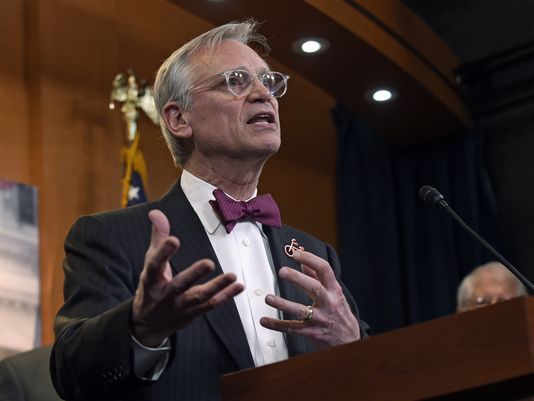Rep. Andy Harris, M.D., is a towering, surprisingly skinny 60-year-old, but as he walks the halls of Congress no heads turn. Tourists haven’t heard of him, national reporters mostly ignore him and rarely does a single one of the thousands of camera phones on the Capitol grounds come out to capture a shot of the four-term Republican from Maryland. While that seemingly perpetual level of anonymity is par for the course for most of the nation’s 435 members of the House of Representatives, Harris has gained notoriety in Washington. Not the Washington we see on T.V., adorned in marble, starched collars and bullshit banter, but the gritty little city surrounding the seat of the federal government that struggles with segregation, high incarceration rates and a few residents still struggling to kick their PCP or opioid habits.
It’s in that Washington that Harris is known as legal marijuana’s greatest foe, because he successfully got Congress to step in and block local Washington officials from setting up a regulatory regime for weed after voters overwhelmingly approved recreational marijuana at the ballot box.But the conservative member of the far-right House Freedom Caucus is an original co-sponsor of legislation that could make marijuana users everywhere smile, because it turns the current debate over pot on its head – connecting the far right to the progressive left when it comes to marijuana.
While Harris opposes most cannabis use, even for most medicinal purposes, he’s a smart guy who studied anesthesiology at Johns Hopkins University, and he sees himself as a pragmatist. So while he hates weed and thinks it’s a dangerous gateway drug, he also recognizes the federal prohibition on all forms of marijuana has left the nation void of serious science on the plant that people are now legally smoking, munching on and vaping from coast to coast. That’s why Harris has teamed up with some of the more pro-pot lawmakers to push legislation that loosens the classification of weed so that universities, hospitals and the private sector can finally study marijuana without fear of getting in trouble with the feds.
While most proponents of the bill think research on weed will prove its medicinal qualities, Harris thinks the opposite. “As a physician, I believe it’s going to show it’s really not helpful in a whole lot of diseases,” Rep. Harris tells Rolling Stone. “And in fact what will be shown to be helpful – as has been [shown] in a lot of the diseases where it’s useful –are actually not the whole marijuana plant but purified components of marijuana, like CBD or THC.”
The current roadblocks for researching weed stem from it being classified as a Schedule I narcotic. That puts marijuana in the same category as heroin, LSD and peyote, while cocaine is merely a Schedule II narcotic. When weed was so stringently scheduled in the 1970s it was mostly used by blacks and Latinos, so many drug experts argue the classification was racist at its core. Others say there were cultural issues at play, because back then white middle-class parents and lawmakers didn’t want their kids to get a hold of the plant that was most associated with anti-war protests and hippies.
But times have rapidly changed, as the majority of states now allow some form of medicinal marijuana and eight states and the District of Columbia now allow legal recreational weed. Initially lawmakers pushing this new proposal, dubbed the Medical Marijuana Research Act, had wanted to give marijuana its own classification – Schedule I C – but instead they agreed to go the less controversial route and just keep marijuana listed as a Schedule I, while drastically reducing the restrictions on studying weed and expediting the review process for research applications at the Department of Justice. The bill would give an exemption for studying marijuana that the DOJ would never grant to people who wanted to research, say, peyote or heroin. All sides agree the current hurdles erected to keep people from researching weed have left a void of knowledge on pot.
“The research is bad,” continues Harris. “I mean, there’s really very little research on the medical application of marijuana.” He argues marijuana has only been proven to help in a very small subset of patients: some pediatric epileptic patients, people with HIV/AIDS who report weed gives them relief from their heavy drug cocktails and cancer patients who say marijuana gives them pain relief an appetite as they go through chemotherapy.
“Once you get past those three, maybe some people with myoclonus from multi-sclerosis, there really is little evidence. There’s no evidence really on PTSD – no good objective evidence,” says Harris, who was a Navy medical commander during Operation Desert Storm. “You know the latest claim that is totally unfounded is that somehow we should use medical marijuana to treat opioid dependence. If we’re going to call it a medicine, we need to approach marijuana the same way we would approach anything else that’s sold as a medicine in the United States, and that is with rigorous scientific research. Which is just too difficult to do under the current rules.”
Rep. Morgan Griffith is also a member of the Freedom Caucus who opposes recreational marijuana, but he supports some forms of medicinal marijuana, especially for kids suffering from epileptic seizures. He learned of the issue when one of his Virginia constituents was forced to move to Colorado in order to legally buy CBD oils for her daughter. Once they moved and could access the lifesaving oil, they reported going from 300 seizures a week down to just two or three. That touched a nerve.
“So we got a bunch of parents out there who love their children who are trying to do the right thing, who don’t care about the law – they care about their children,” Griffith tells Rolling Stone. “And we’re making them into criminals by making them have to cook this up themselves. It’s outrageous – and they don’t know what the right level is.”
Think of the new proposal as a high stakes game of legislative poker: Rep. Harris is putting his money where his mouth is and betting the science will be on his side, while the pro-pot lawmakers are seeing his bet.
“The deal that Andy and I worked out was, let’s at least get legal possibilities to do extensive research. And once we have the science then we can argue about whether or not there’s a legitimate medicinal use. I think there is, he thinks there isn’t, but he’s welcoming the science to be done,” Griffith continues. “You know most of your research facilities don’t want to invest in something where they might be in trouble a year from now or two years from now. So we want to give them that stability that as long as you’re using it to research for medicinal purposes, let’s use it. And of course as I’ve always said, if we can use opiates and barbiturates, we certainly ought to be able to use marijuana for medicinal purposes.”
Proponents of the bill think it will easily pass, especially because Harris is an original sponsor of the legislation and party leaders often defer to him on weed because he’s a doctor and is more passionate in his opposition to weed than most in the party. Having him on the bill gives moderate and more conservative Republicans cover. But now the question is when can proponents get the legislation on the floor – and that may prove difficult because of the lingering health care debate and the dark cloud of the Russia investigation that hangs over everything and seems to expand weekly.
“Things have been a little upsetting around here. You know people are distracted. But my intention is to work with Andy and get that moving, early in this Congress, to stop the prohibition on research,” Democratic Rep. Earl Blumenauer, an Oregon lawmaker who is the most vocal marijuana advocate in Congress and original sponsor of the scheduling bill, tells Rolling Stone. “The federal government has been a tremendous obstacle, and there shouldn’t be these unresolved questions. We should be able to have product uniformity. We shouldn’t have to guess about the impacts. I mean, there’s anecdotal evidence that is very powerful, but it should be peer-reviewed, gold standard research, and the federal government has prevented that. And I don’t think anybody objects to being able to get rid of those obstacles.”
That’s why Harris, that anti-pot doctor, continues to work behind the scenes to convince skeptical Republicans to support the bill.
“I would make the argument to them, this is really just common sense. This is not expanding recreational marijuana,” he says. “This is just saying, ‘Look, we believe that Americans patients deserve that same level of scrutiny that we give any other thing that we call medicine in this country. I don’t want to deny anyone, any patient in America, access to a drug that’s been shown to work. It’s been my entire career in legislating trying to expand access to drugs that work. The fact of the matter is just [that there’s] very, very poor evidence that, outside a very small range of diseases, marijuana is in fact an efficacious medicine.”
credit:harris.house.gov













